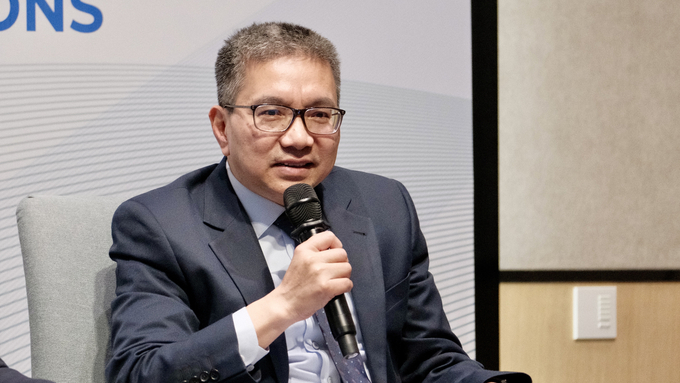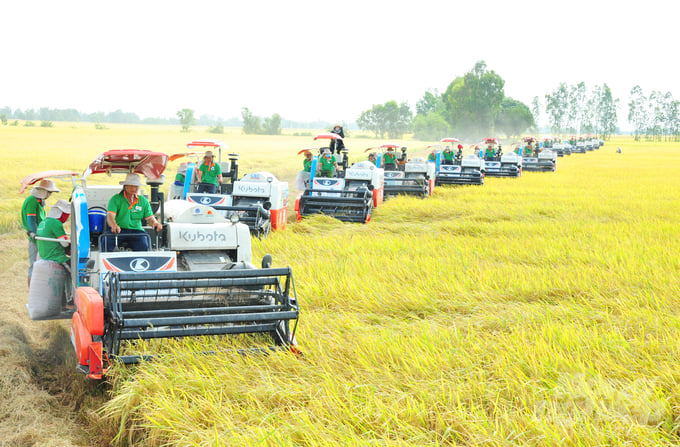May 16, 2025 | 17:10 GMT +7
May 16, 2025 | 17:10 GMT +7
Hotline: 0913.378.918
May 16, 2025 | 17:10 GMT +7
Hotline: 0913.378.918

Economist Li Guo - Coordinator of the World Bank's National Agriculture Program in Vietnam - is an important contributor to many sustainable development initiatives. Photo: Quynh Chi.
"The World Bank (WB) is committed to fostering a closer relationship, enhancing cooperation, and achieving positive results in partnership with the Ministry of Agriculture and Environment," Mr. Li Guo conveyed his sentiments regarding the Government of Vietnam's organizational transition on behalf of the World Bank.
The Sustainable Agriculture Transformation Project in Vietnam (VnSAT) has been an achievement, resulting in the growth of agricultural cooperation between the Vietnamese government and the World Bank in 13 provinces of the Mekong Delta. WB partners have held this collaboration in high regard, and it was instrumental in the project's acquisition of the East Asia Regional Team Award in 2023.
WB experts praise initiatives such as "Three Reductions, Three Increases" and "One Must, Five Reductions" for achieving extremely favorable outcomes for the VnSAT project. Vietnamese experts have had the opportunity to exchange knowledge and collaborate with international specialists through the use of World Bank resources. They have collaborated to create cutting-edge farming methods that are both extremely effective and consistent with the traditional practices of farmers in the Mekong Delta provinces.
The Project, which is a sustainable development plan for one million hectares of high-quality, low-emission rice in the Mekong Delta, was established through the consolidation and expansion of sustainable practices that were implemented on 180,000 hectares under VnSAT. VnSAT has established a significant foundation, functioning as a success story that has attracted the attention of international research organizations and numerous countries that are committed to sustainable development.

The 1 million hectare high-quality, low-emission rice project is in the final design stage and is about to enter the implementation phase. Photo: Le Hoang Vu.
Mr. Li Guo affirmed: “The Project has opened up extensive opportunities. We are anxiously anticipating the opportunity to collaborate in the implementation of innovative solutions, particularly given that the Project is currently in its final design phase.
In Vietnam, the International Rice Research Institute (IRRI) is presently conducting research and testing on a variety of science-based farming methods, such as the alternate wetting and drying irrigation method, rice-shrimp farming models, and mushroom cultivation on rice straw.
The most critical aspect is to guarantee that these endeavors provide farmers with tangible benefits, such as the ability to access and implement advanced farming models, increase their incomes, and contribute to national food security," the WB representative highlighted.
He observed that food security is not currently a significant concern in Vietnam. Nevertheless, it will be exceedingly challenging to anticipate potential obstacles in the future.
“We have closely followed the restructuring process and understand the motivations behind these changes. The merger of certain agencies and organizations is not merely about streamlining the administrative apparatus; more importantly, it aims to enhance operational efficiency.
Simplifying the management system will facilitate the reduction of administrative obstacles and the expediting of intricate procedures. We are firmly in favor of reforms in this regard and consider them to be a substantial advancement.
Certain issues require a comprehensive approach, particularly climate change and carbon credits. These are also key factors that we have explored in collaboration with the Ministry of Natural Resources and Environment (MONRE) and the Ministry of Agriculture and Rural Development (MARD) to establish mechanisms for cooperation and financial payments, which directly impact the Project,” Mr. Li Guo expressed, emphasizing his support for the restructuring initiative as a positive move.
Therefore, the World Bank eagerly anticipates the Ministry of Agriculture and Environment's official commencement on March 1, and it anticipates ongoing effective collaboration.
He stated: "Certainly, we acknowledge that the system will require time to optimize its operations and refine its processes." Nevertheless, the World Bank is optimistic that the Vietnamese government's administrative apparatus will operate effectively and guarantee the consistency of policy implementation.
Despite the growing complexity of climate change challenges, Vietnam's population of 100 million necessitates the establishment of sustainable livelihoods for its citizens. Not only is it necessary to sustain agricultural productivity, but it is also necessary to adapt to environmental changes in a flexible manner.
Translated by Linh Linh
![Multi-channel, multi-directional Vietnamese agricultural markets: [7] Deep processing makes global reach easy](https://t.ex-cdn.com/nongnghiepmoitruong.vn/608w/files/huytd/2025/05/16/2946-che-bien-sau-chia-khoa-vang-nang-tam-nong-san-viet-tren-ban-do-the-gioi-080603_110-093858.jpg)
(VAN) The application of deep processing technology is helping Vietnamese agricultural products enhance their value, create competitive advantages, and open doors to conquer global consumers.
![Multi-channel, multi-directional Vietnamese agricultural markets: [6] Agri products go online](https://t.ex-cdn.com/nongnghiepmoitruong.vn/608w/files/content/2024/12/10/1-113313_954.jpg)
(VAN) Bringing agri products onto e-commerce platforms is an effective way to build a brand that many businesses, cooperatives, and agricultural production households are doing.

(VAN) Veterinary training should focus on quality, not just quantity. Veterinarians also need more options to pursue specialized training.

(VAN) The veterinary industry needs to be viewed objectively and further invested in to properly demonstrate its role and importance in the new context.

(VAN) The number of veterinarians graduating each year is not enough to meet actual needs, hence a difficult problem for the growing livestock industry.

(VAN) The strategic partnership between Cambodia, the Philippines, Vietnam, and CGIAR ensures that innovative solutions effectively address national priorities for food system development.

(VAN) This was affirmed by the UK Minister of State at the Department for Environment, Food and Rural Affairs during a working session with Deputy Minister Tran Thanh Nam on May 13.